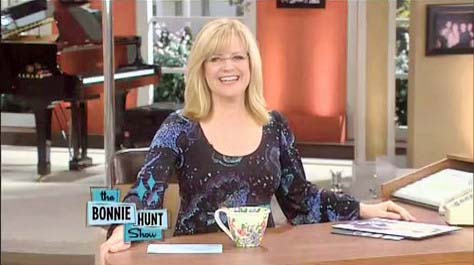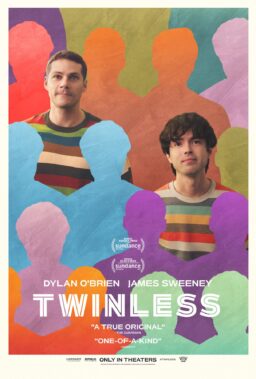I’ve sort of known Bonnie Hunt for awhile, from Second City and here and there, and I really like her. She’s funny, direct, down to earth, and has real feelings. What you see is what you get. She’s one of seven kids from an Irish Catholic family in Chicago and hasn’t missed a home opener at Wrigley Field since 1977.
So I tuned in her new daytime talk show on Tuesday, and I liked the opening chat (“What kind of woman irons her husband’s sheets? Even the clothes I wear, I just throw ’em in the dryer with some golf balls”). I believe she actually does that.
It’s Veterans’ Day, and she has two guests, Patrick and Patty Horan. I’m thinking, this is that obligatory public service feature. She met them at a benefit last February for the rehab center where Capt. Horan was recovering after taking a bullet through his head in Iraq.
Bonnie doesn’t mention this, but I’m pretty sure she wasn’t just a TV star on display at a benefit; I’ll bet she’s done volunteer work at that center. After school she worked as an oncology nurse at Northwestern Memorial Hospital. She started a little improv company a few years later, and then started taking night classes at Second City. Then she was appearing on their stage.
She nursed full-time until it became clear that comedy was her vocation. She came back to Northwestern to try out her routines on her patients. She never told me any of this. I heard it around. When her patients checked out one way or the other, she kept coming back anyway. None of the patients knew who she was, so it wasn’t a photo op.
When I saw Patrick Horan walk on the set, I knew a lot of things, having been four times through the Rehabilitation Institute of Chicago. I knew brain injuries were devastating. That he had to learn from scratch to walk like that. At first he had no idea what was going on, his wife Patty said. Even when he got better, he was very, very bad. In February, when Bonnie met them, he couldn’t walk or talk. Bonnie showed photos of his head stitched together, and of him taking PT classes in rehab. Now he walked and smiled and talked to her. He missed a word or two, but that was meaningless. He was fine. Here was a man who has brought himself back from a near-vegetable to a talk show guest, and here was his wife, who quit her job to be his caregiver.
Patrick and Patty Horan are an inspiration. I know they won’t mind if I focus a moment on Bonnie Hunt. She didn’t take any opportunities to pat her own back about her volunteer work. She didn’t get all weepy. She looked Capt. Horan straight in the eyes, and talked gently but realistically about his injury and his recovery.
I know that tone of voice. It’s how a good nurse speaks. She’s sorry you have your problems, but she isn’t there to provide sympathy. She’s there to get a hard job done, to give the right medication and get her gloves dirty and accept terrible sights as part of her life.
Something else. She didn’t say, “Get well soon!” A nurse knows that on any given day the patient is as well as possible. That the patients are trying to get well, but they don’t control the timetable. What they need is sensible recognition of their conditions, and all the help they can get.
Bonnie Hunt is clear-minded, wise, grown up, pretty, and very funny. And she touched me with her instinctive tact, which must have felt so much better to Capt. Horan than gushes of sympathy. I’m pretty sure that when people praise his courage, he thinks to himself, “What choice do I have?”
“The Bonnie Hunt Show” is nationally syndicated. and in Chicago, runs on Ch. 5 at 2 p.m. weekdays.












